
Mistakes Accounting Companies Make When It Comes To Local Search
Accountants are meticulous when it comes to handling their clients' business accounts. However, with regards to local SEO, they can often make costly mistakes. Causing them to miss out on vital leads or lose top search engine ranking positions.
To avoid that, we're breaking down the 11 biggest mistakes accounting companies make.
Let's begin!
11 Biggest Local SEO Mistakes Accounting Companies Make
1. Not Having a Google My Business Listing
Google accounts for 85.5% of the global search market share. So, to rank high in its local searches, it's vital to have a Google My Business listing.
That's because Google gives preference to accounts with a GMB profile, using information such as proximity, keywords, NAP info, reviews, etc, to rank businesses.
For example, a startup is looking for an accountant near its office. When they search, all the accountants with a GMB profile in that area will show up. If you don't have one, you won't rank in the top three spots - missing out on potential leads.
Here are some more advantages of a GMB listing:
- Appearing in the local 3-pack on SERPs, as shown in the image, the chances of getting potential leads are more from here.
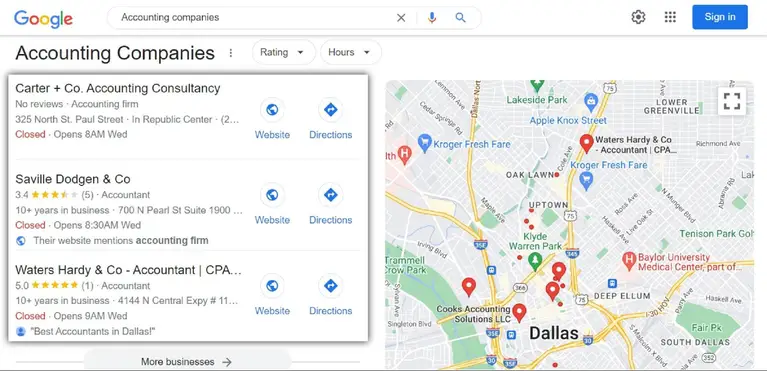
- Showing up on Google Maps,
- Allowing clients to review your business,
- It's free and easy to use, etc.
So, if you don't have one, get a Google My Business profile for your accounting business today!
Read: Step-by-step Setup Guide for Google My Business Set up
2. Wrong NAP information
Another crucial mistake accounting companies can make is not updating their NAPW info on websites and listings. It's natural to change offices, phone numbers, etc.
However, how are potential clients supposed to find you unless you update this information on all platforms?
Additionally, Name, Address, Phone number, and Website information are key signals used by search engines when ranking companies on result pages.
The tools like Advicelocal, Mozlocal, or Brightlocal offer whether or not your NAP details are consistent throughout the web.

Crawlers constantly comb through websites, social media profiles, listings, etc., to corroborate information. Therefore, if there is inconsistency in NAP info, it will decrease your search rank.
For example, say you've listed your profile name as 'Athena Accounting' on Google My Business. However, on your website, it's 'Athena Chartered Accountants.' Inconsistencies such as these can cause search engines to rank you lower. Additionally, it confuses potential clients.
So, ensure that:
- Name and address of your company are spelled/written in the same way across all platforms,
- All phone numbers and websites are correct and active.
3. No Reviews
When was the last time you blindly bought a product or hired a professional without references or reviews?
Chances are, you haven't.
Interestingly, 68% of consumers say that online reviews influence their trust in a business. Search Engines understand this sentiment, which is why client reviews and ratings are a ranking factor.
However, there is more to reviews than just acquiring them. For example, say your accountant company has multiple reviews, and you've taken the time to respond to the client's praises and issues.
A company that responds to negative and positive reviews sends a strong signal to search engines that your company is trustworthy and an authority.
Therefore, review signals are a significant factor and should not be overlooked. Accountants can acquire reviews by:
- Sending clients their GMB profile link and asking for reviews.
- Creating an online feedback form. You can use free Google Forms to get reviews.
- Send out an e-newsletter asking clients to review your business on various platforms or your website.

4. Irrelevant Backlinks
Creating a backlink profile can help your local SEO immensely when done right. However, many accounting companies don’t take the time to build these links; worse, the links they have aren’t relevant to their industry or specific area.
So, for example, ask a local financial publication to run a feature on your company and link your website to the article. This sends a signal to search engines that:
- Your firm is located in a specific area.
- Your firm is an authority in your niche.
Linking your accounting firm with reputed accounting schools, media houses, bloggers, etc., will strengthen your local SEO efforts. Conversely, backlinks from sources that don’t contribute to your identity can confuse search engines, reflecting a lower rank.
As an accountant or firm, your time is better spent attending to clients. We suggest hiring a digital marketing agency to acquire backlinks to grow your local SEO presence.
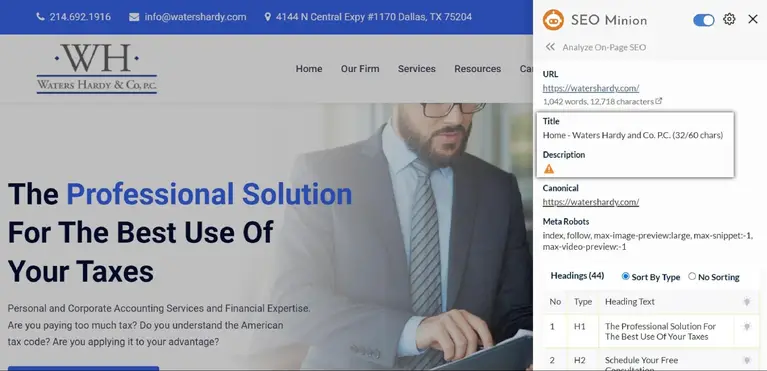
5. Missing Location-Specific keywords
Keywords are the cornerstone of any effective SEO strategy. However, a simple 'best accountant' keyword isn't helping your business show up in local searches when it comes to local SEO.
Local keywords must be specific enough to encourage your desired local traffic and fulfill user search intent.
That's why it's essential to implement location and service keywords into the content.
For example, a Washington DC accounting firm will appear in more local searches using keywords such as 'Washington Certified Accountant' or 'Chartered Accountant Washington.'
After curating a list of effective location and service-specific keywords, optimizing your website using them is important.
So, add these keywords to the:
- Blog content,
- URLs,
- Meta descriptions,
- Site maps,
- Headings, etc.
You can maximize your local SEO presence by implementing these keywords in your content marketing strategy and technical SEO efforts.
6. No Listings in Accounting Directories
Many signals contribute to your accounting company's appearance in local searches.
Authority in your niche, accounting keywords, reviews, etc., are some signals that solidify your company's identity and location. So, the more cohesive the information is from various sources, the better your local SEO performance.
For example, a potential client searches online for an accountant in Brooklyn. The results show multiple firms in the area.
The screenshot below shows a directory ranking in the top position for the accounting firm inquiry.
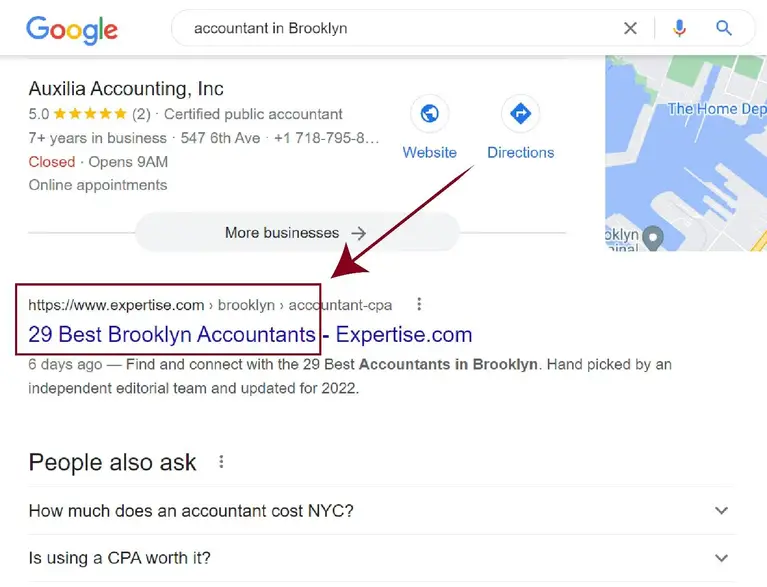
However, you will rank higher since you have listings on accounting sites and popular ones. Clients will also notice that your industry peers recognize your company by being on these listings.
So, having listings on sites like Google my Business, Bing Places, and Yelp is a great place to start.
However, claim your listings on these directories for accountants:
- CPAdirectory.com - database for more than 500,000 firms/professionals.
- CPAfinder.com - find professionals by zip code.
- AICPA - The American Institute of CPAs has more than 431,000 members/listings.
7. Not Optimizing Pages for Local SEO
Having a website is a great advantage when growing your local online presence. That's because you can optimize it for local SEO. However, a mistake many accountants make is that after optimizing for general SEO, they stop and don't focus on local content.
For example, say you're an accountant in Malibu and want more clients in that area. Then you need to show up specifically in that location, as shown in the below screenshot. It helps the audience find your place easily.
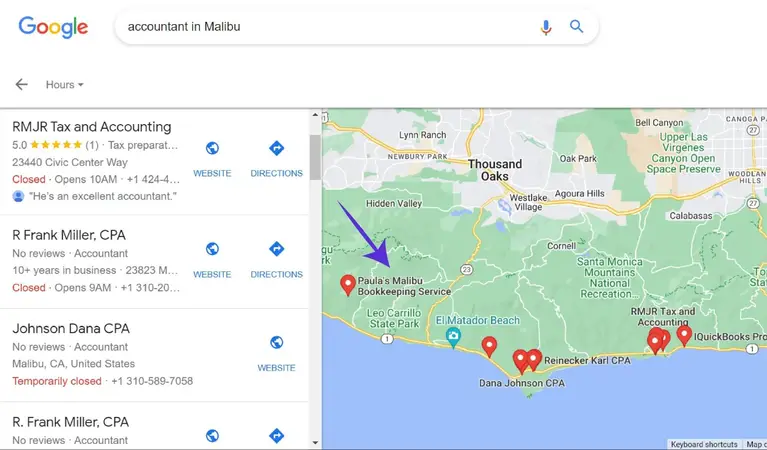
General SEO will attract traffic from all over the world. However, by optimizing your web pages with Malibu and industry-specific content, you will get quality leads in Malibu that are interested in your accounting business.
Optimize your pages for local searches and intent by:
- Adding NAPW info on all service pages.
- Curating location and industry-specific content.
- Doing local technical SEO - meta tags, site maps, URLs, etc.
- Create content based on local search intent, etc.
8. Website Isn’t Responsive On Mobile
Regarding finding local businesses online, 58% of people make those searches on mobile devices. That's because people carry their phones with them wherever they go. Therefore, when the need to search comes up, even on the go, it's easier to do so on a mobile search.
Additionally, search engines give responsive websites on mobile a boost in rankings. Plus, it gives you an edge over the competition.
For example, say your competitor doesn't have a mobile-friend website. A potential client clicks on their website, but it's difficult to view and hard to use.
For example, in the below screenshot, a site that loads properly on a desktop shows incomplete content to the users on mobile phones.
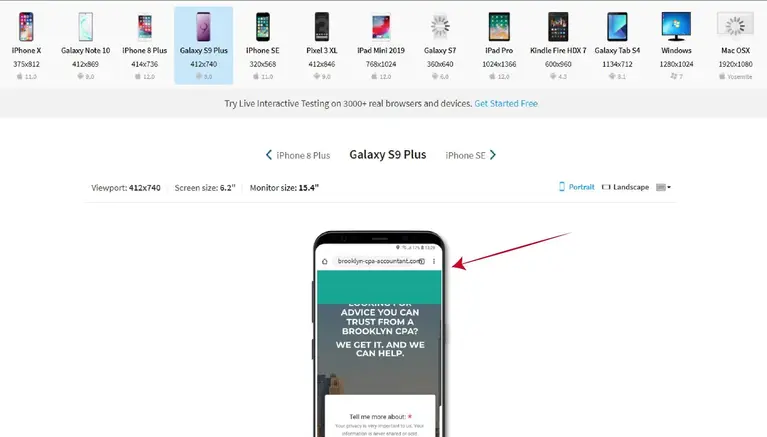
Therefore, they click off and find your easy-to-use mobile website. Who do you think they'll go with?
So, ask your developer to make your existing website mobile-friendly. If you've yet to make a website, check out WordPress, Wix, and Squarespace templates, which are compatible with desktop and handheld devices.
9. Technical SEO Doesn’t Reflect Location
The building blocks of your accounting website are just as important as the content it displays. Elements such as broken links and slow page speed contribute significantly to your global search ranking.
However, many accounting companies don't go that extra step further to optimize the technical aspects of their website with local SEO. That's important when you want to boost your local search reach.
The firms can use tools like AHrefs to find technical SEO issues and fix them. It enhances rankings and the opportunity to attract more audiences.

For example, say your firm is based in Atlanta. And you have an article on your blog about the '10 best accounting practices for small businesses in Atlanta.'
However, your URL says 'accounting tips for small businesses' - this URL doesn't indicate to search engine crawlers that your content is specific to Atlanta.
Rectify this mistake by asking your developers to add local keywords to:
- Site maps
- Meta descriptions
- URLs
- Headers,
- Alt tags, etc.
You will see a steady increase in your local SEO efforts as soon as you do this.
10. Poor Local Content
Many accounting firms or professionals don't have the time to create unique blogs or website content. They're busy with client work. Therefore, the published content is either duplicated or doesn't reflect the search queries of their potential clients. Some companies, as shown in the below image, don’t even consider having informative pages rather than sales and about pages.

It's no secret that Google and other search engines want to show their users the most relevant and targeted results. So, writing a blog about the latest audit or tax policy is not enough. It must go deeper and add value to a user's search intent.
For example, topics such as 'How new tax policy affects business owners in Detroit' is more effective than 'Tax policy changes in Detroit.' Therefore, creating quality content that focuses on local clients and their needs is the best way to make the most of your local SEO efforts.
Hire a content marketing firm to:
- Do a content audit,
- Create consistent content,
- Repurpose old content,
- Optimize old content for local SEO.
11. Only Targeting the Main City
Local SEO, as the name suggests, is optimization based on location. It doesn't state that there must be only one location. Many accounting firms will do local SEO for the city they're in. However, targeting the areas closest to their office is very beneficial.
For example, an accounting firm in Manhattan will have to compete hard to get the top spots for the whole city. However, say their office is located in Midtown.
By including neighboring places such as Murray Hill or Turtle Bay in their content, they will start to rank in more of those searches. And also reduces the number of competitions for the keyword, as shown below.

If you don't have an in-house team of experts like other accounting firms, then it's best to hire a digital marketing agency. Their SEO experts look into location keywords, search intent, buy personas, etc. All of which can significantly improve an accounting company's local reach.
Key Takeaways
1. Maintain NAP consistency on all platforms.
2. Ask for reviews from clients.
3. Claim and maintain your Google My Business profile.
4. Claim your Google Maps profile.
5. Acquire backlinks from reputed accounting publications/establishments in your area.
6. Optimize your service pages with location information.
7. Add location and industry keywords to URLs, Meta descriptions, Alt tags, etc.
8. Make your accounting website responsive to mobile users and other devices.
9. Curate relevant content that uses location and industry keywords.
10. Respond to reviews on listings and interact with customers.
ABOUT THE AUTHOR:
Brice Decker

Brice has been handling marketing projects for more than 12 years and he is providing consulting services on SEO, Social Media and PPC. He has a huge expertise in working at large corporations including Accenture Interactive & PwC Digital Services.
ABOUT THE AUTHOR:
Brice Decker

Brice has been handling marketing projects for more than 12 years and he is providing consulting services on SEO, Social Media and PPC. He has a huge expertise in working at large corporations including Accenture Interactive & PwC Digital Services.
Related Post
How to Rebrand Your Business Without Losing SEO?